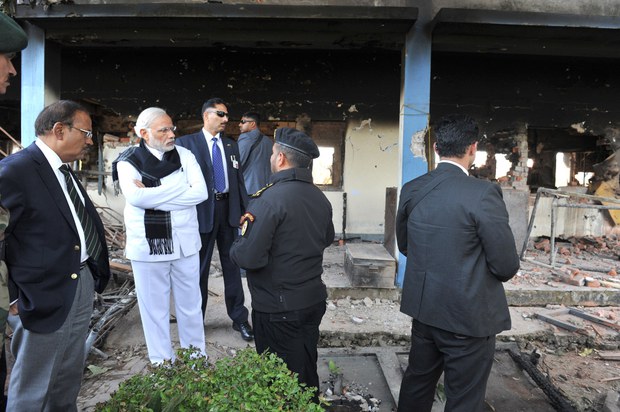Pakistan Claims Arrests Linked to Indian Air Base Attack
2016.01.11
 India Prime Minister Narendra Modi, wearing white suit, meets with security forces at Pathankot Air Force Station following a militant attack that left seven soldiers dead, Jan. 9, 2016.
India Prime Minister Narendra Modi, wearing white suit, meets with security forces at Pathankot Air Force Station following a militant attack that left seven soldiers dead, Jan. 9, 2016.
Uncertainty loomed over talks slated for later this week between the foreign secretaries of India and Pakistan, even as Islamabad claimed Monday to have arrested an unspecified number of people in connection with an attack on an Indian air base on Jan. 2.
Security forces in Pakistan carried out raids in the Gujranwala, Jhelum and Bahawalpur districts on Monday, leading to “some arrests,” the Press Trust of India quoted unnamed Pakistani intelligence officials as saying.
“A probe is on-going to ascertain if they were involved in the attack or some of them facilitated it,” the officials said.
The action came days after India said it had provided crucial evidence to Pakistan linking the six attackers of Punjab’s Pathankot Air Force Station, located about 40 km (25 miles) from the Pakistani border.
The pre-dawn attack, which Indian security forces suspect was carried out by Jaish-e-Mohammad (JeM) operatives, left seven Indian security personnel dead while six intruders were killed in a gun battle that lasted three days.
The attack followed Indian Prime Minister Narendra Modi’s unscheduled stopover in Pakistan on Dec. 25, where he met with counterpart Nawaz Sharif while returning from a trip to Afghanistan.
India and Pakistan have had a bitter relationship since the partition of the Indian sub-continent in 1947. Bilateral tensions have revolved largely around the restive Himalayan region of Kashmir, over which both countries have territorial claims.
Joint investigation
On Monday after the arrests, Sharif announced that he had set up a high-level joint investigation team of officials from the Intelligence Bureau (IB) and the Inter-Services Intelligence (ISI), to probe if the Pathankot attack was in any way linked to Pakistan.
Pakistani officials, however, rejected a key piece of evidence provided by India – details of phone calls made by the attackers to their alleged handlers in Pakistan hours before the assault – saying those numbers were unregistered.
While the United Jihad Council, an alliance of 13 pro-Pakistani groups based in Pakistan-administered Kashmir, has claimed responsibility for the attack, Indian security agencies allege that JeM chief Masood Azhar, and his deputies Abdul Rauf Asghar, Ashfaq Ahmed and Kashim Jaan masterminded the attack from a base near Lahore.
Azhar is believed to have founded the JeM after India released him in exchange for passengers of a hijacked Indian airliner, following a week-long standoff in 1999.
India had warned Pakistan last week that it would consider going through with the scheduled peace talks only if it kept up its promise of prompt and decisive action against the handlers of the Pathankot attack.
Even as India’s External Affairs Minister Sushma Swaraj and Home Minister Rajnath Singh met on Monday to discuss the status of foreign secretary-level talks slated for Friday in Islamabad, there was no official confirmation as of press time if the talks would be held as scheduled.
“Pakistan’s open declaration that it is taking appropriate action on the information supplied by India must be accepted at face value. This is good enough to continue the talks,” former Delhi High Court Chief Justice Rajinder Sachar said in a statement. “This opportunity, if lost will only help the terrorists in plotting both against Pakistan and India.”
Suspects not identified
Despite the skepticism in India over the arrests in Pakistan, considering that the number or identities of the suspects had not been revealed, New Delhi-based political analyst Imtiaz Ahmad said talks must not be stalled.
“I see the arrest of some suspects by Pakistan as a positive development. It should satisfy the Indian government enough to continue the dialogue,” Ahmad told BenarNews.
He said the arrests could be an attempt by Pakistan to convince the United States that it was serious about tackling terrorism.
“But I still look at the Pakistani commitment of nabbing some suspects with some degree of scepticism. It is obvious the arrests have been made under pressure from the U.S. and it is a possibility that Pakistan may not take any further action,” Ahmad said. “But let’s keep our fingers crossed.”
U.S. Secretary of State John Kerry on Saturday called Sharif, urging him to act upon the evidence provided by India while highlighting the need to stay the course.
“Continuation of India-Pakistan talks are needed in the interest of regional stability and the leadership role by both prime ministers is required to ensure continuous dialogue,” Kerry said in a statement issued by Pakistan’s Prime Minister’s Office.
The statement quoted Sharif as having told Kerry that Pakistan is “swiftly carrying out investigations in a transparent manner and will bring out the truth” behind the Pathankot attack.
“Pakistan is eliminating terror from its soil and will not allow anyone to use Pakistani soil to conduct terror operations abroad,” Sharif said.







